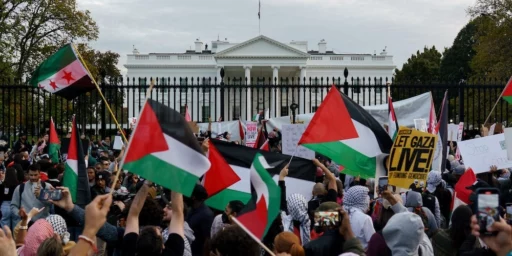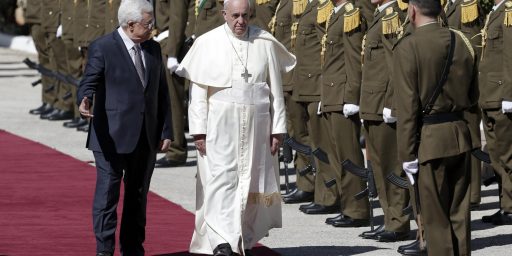Palestine, Not Iraq, Is The Best Shot At an Arab Democracy
Jonathan Rauch argues that, contrary to the assertions of the Bush administration, Palestine is a much more likely candidate to be a successful Arab democracy than Iraq.
Palestine, Not Iraq, Is The Best Shot At an Arab Democracy (National Journal via Atlantic Monthly $)
Like it or not, America’s foreign policy is hostage to an ambitious and difficult nation-building effort in the very heart of the Arab world. The demise of a corrupt, authoritarian, and incorrigibly violent leader has led to a power vacuum that American foreign policy must fill with a stable government that is internally democratic and externally peaceful.
Working against American interests is a loose coalition of violent nationalists, Islamic extremists, and opportunistic gangs. They have little in common but a willingness to use violence to prevent the establishment of a democracy. Even if they cannot finally take over the country, they calculate that their interests would be better served by chaos than by a strong central authority that would put them out of business.
For its part, the central government is pitiably weak. Its security forces are numerous but ill-trained and unreliable, more apt to flee or switch sides than to fight. But the government and its American friends have a plan: Use elections and the lure of politics to co-opt many militants while isolating the rest. Meanwhile, provide enough calm and prosperity to give wary moderates, who fear the extremists but mistrust the authorities, a stake in the fledgling government’s success.
So there it is: a footrace between democratization and destabilization. As of now, it’s touch and go. What is clear is that the outcome will figure centrally in U.S. foreign policy and in the politics of the Arab world, if not the whole world, for years to come.
I speak, of course, of Palestine.
A year ago, Yasir Arafat died. His passing brought new hope for progress toward peace in the Israeli-Palestinian conflict. It also brought a subtle but important change in America’s realistic aims in the region. With Arafat gone, the emergence of an accountable Palestinian government became possible. What had been primarily a peacemaking effort became primarily a nation-building effort. Like Iraq—only, perhaps, more hopeful.
[…]
The dominant political forces in Iraq are centrifugal, as the country fissions along Shiite-Sunni-Kurdish and secular-Islamist lines, whereas Palestinian sentiment seems to be coalescing into something like a common national identity—a polity. Iraq is bedeviled by foreign jihadis who are immune to politics, whereas Palestine’s militants are homegrown and usually responsive to popular opinion. In the outside world, nation building in Iraq is widely seen as an American project; by contrast, Europe and Russia, moderate Arab states (especially Egypt), and the United Nations are all engaged in Palestine and genuinely want success there.
Above all, there is this: If a successful democracy emerges in Palestine, it will not be at the point of an American gun. In the very shadow of Jerusalem, an Arab people will have found their own path to democracy, and the government’s legitimacy will be unassailable. The echo throughout the Arab and Muslim world might be thunderous. Indyk argues that it is Palestine, not Iraq, where investment in democracy-building is most likely to pay off. The road to Baghdad may lead through Ramallah.
Of course, the fact that we have to sit on the sidelines and hope in the Palestinian case whereas we can take decisive action in the Iraqi case is not insignificant.






I’m not sure that we have to sit on the sidelines and hope… certainly Palestine is a heck of a lot smaller than Iraq, with much much more secure borders.
If we could manage to pivot from Iraq to Palestine, it would be nice, though I do not see how this is really practicable.
Certainly a case could me made that we should have chosen to begin with Palestine rather than Iraq. After all, the Palestinian issue is part of what is propping up the corrupt regimes in the Middle East.
I was not a fan of Clinton foreign policy, but I do believe that the current administration made a mistake when it put Palestine on the back burner (at a boil… not a simmer). At times I think there was a tendency simply to take the opposite tack of the previous administration.
Certainly, a serious initiative for finally settling the Palestinian issue could help take some of the sting out of Iraq… I do not relish the propaganda victory for militants if (I believe when is more the question) we withdraw from Iraq.
The best hope for Arab democracy in the Occupied Territories is for the Arabs to insist that Israel annex the West Bank and Gaza and make all the Arabs Israeli citizens.